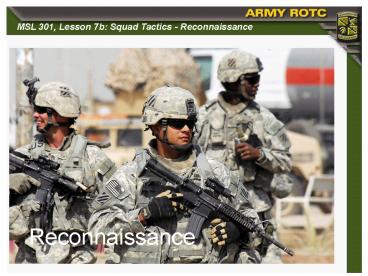Reconnaissance - PowerPoint PPT Presentation
1 / 23
Title:
Reconnaissance
Description:
Reconnaissance operations are undertaken to obtain (by visual observation or ... characteristics and the indigenous population of a particular area (FM 1-02) ... – PowerPoint PPT presentation
Number of Views:3642
Avg rating:3.0/5.0
Title: Reconnaissance
1
Reconnaissance
2
Reconnaissance Operations Defined
Reconnaissance operations are undertaken to
obtain (by visual observation or other detection
methods) information about the activities and
resources of an enemy or potential enemy. They
are designed to secure data concerning the
meteorological, hydrographical, or geographical
characteristics and the indigenous population of
a particular area (FM 1-02). The four forms of
reconnaissance are route zone area and
reconnaissance in force.
Define Recon
REF FM 3-21.8, Chapter 1, Section 1-225, Page
1-42 (Mar 07)
3
Recon
- Environmental
- Road conditions
- Bridges, Tunnels
- Structures,
- Soil Trafficability
- Significant terrain features (lakes, mountains,
etc.)
- Enemy
- Strength of force
- Force structure
- Physical condition
- Nature of weapons/ equipment
- Pattern of activity
4
The Four Fundamentals
- Gain information
- Avoid Detection
- Employ security measures
- Task organize
5
Five Point Contingency Plan
6
Recon - Four Types
- Area
- Zone
- Route
- In Force
7
Area Recon
- This is a recon conducted to obtain information
concerning a specific location and the area
immediately around it
8
Leaders Recon
9
Movement
- Avoid paralleling the objective
- Maintain stealth
- Dont cross the LOA
- Use cover concealment
10
Establish Security
11
Return to Rally Point
- Gathered all PIR
- Reached the LOA
- Allocated time elapsed
- Contact has been made
12
Dissemination
- Recon Log
- Panoramic sketch
- Terrain sketch
- SALUTE Report
13
What to Report
14
Routine Equipment Carried
- Uniform
- Soft Cap
- LBE
- Sheath Knife
- Smoke Grenades
- Compasses
- Pen Light
- Ruck Sacks
- Ponchos
- Notebooks
- Gloves
- Socks
- At least one weapon with automatic fire
capability - Ammo / Individual weapon
- Chow / Water
- Maps
- Wire Cutters
- Flashlights
- Commo Gear
15
Special Equipment Carried
- Night Vision Devices
- Camera
- Binoculars
- GPS
- UAV
16
Zone Recon Techniques
- Moving Elements
- Fan
- Box
- Converging routes
- Successive sector
- Stationary Teams
- Multiple Area Recon
17
Moving Elements - Fan Method
18
Box Method
19
Converging Routes Method
20
Successive Sector Method
21
Route
- Trafficability
- Enemy activity
- NBC contamination
- Adjacent terrain
22
Route Considerations
- Preferred method is fan consider extensive
intersections. - Platoon should use a different return route.
- Roads should be treated as a danger area.
- Patrol report submitted in overlay format.
23
Questions?






























![(PDF) Reconnaissance and Bomber Aces of World War 1 (Aircraft of the Aces, 123) [PDF] PowerPoint PPT Presentation](https://s3.amazonaws.com/images.powershow.com/10122301.th0.jpg?_=20240906118)
